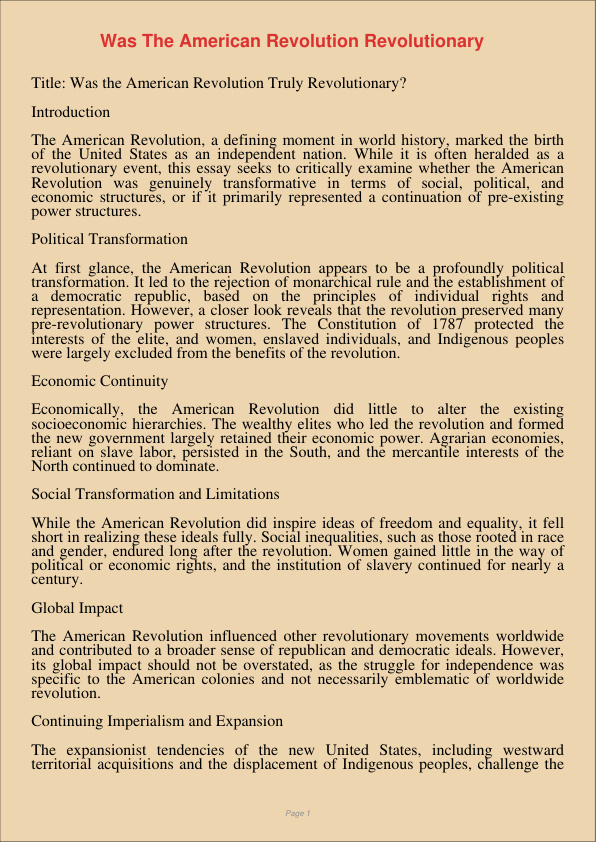Title: Was the American Revolution Truly Revolutionary?
Introduction
The American Revolution, a defining moment in world history, marked the birth of the United States as an independent nation. While it is often heralded as a revolutionary event, this essay seeks to critically examine whether the American Revolution was genuinely transformative in terms of social, political, and economic structures, or if it primarily represented a continuation of pre-existing power structures.
Political Transformation
At first glance, the American Revolution appears to be a profoundly political transformation. It led to the rejection of monarchical rule and the establishment of a democratic republic, based on the principles of individual rights and representation. However, a closer look reveals that the revolution preserved many pre-revolutionary power structures. The Constitution of 1787 protected the interests of the elite, and women, enslaved individuals, and Indigenous peoples were largely excluded from the benefits of the revolution.
Economic Continuity
Economically, the American Revolution did little to alter the existing socioeconomic hierarchies. The wealthy elites who led the revolution and formed the new government largely retained their economic power. Agrarian economies, reliant on slave labor, persisted in the South, and the mercantile interests of the North continued to dominate.
Social Transformation and Limitations
While the American Revolution did inspire ideas of freedom and equality, it fell short in realizing these ideals fully. Social inequalities, such as those rooted in race and gender, endured long after the revolution. Women gained little in the way of political or economic rights, and the institution of slavery continued for nearly a century.
Global Impact
The American Revolution influenced other revolutionary movements worldwide and contributed to a broader sense of republican and democratic ideals. However, its global impact should not be overstated, as the struggle for independence was specific to the American colonies and not necessarily emblematic of worldwide revolution.
Continuing Imperialism and Expansion
The expansionist tendencies of the new United States, including westward territorial acquisitions and the displacement of Indigenous peoples, challenge the notion of a purely revolutionary nation. The new American government continued many imperialistic practices of the British Empire.
Economic Growth and Capitalism
The economic consequences of the American Revolution favored the growth of capitalism, but these changes benefited the elite class more than the broader population. The development of industry and commerce did not necessarily lead to widespread prosperity or economic equality.
Conclusion
While the American Revolution undoubtedly brought about profound political and philosophical changes, it is essential to recognize its limitations and continuities with the pre-revolutionary era. The preservation of power structures, economic inequalities, and social hierarchies underscores the complex nature of this historical event. The American Revolution can be seen as revolutionary in some aspects, particularly in terms of its political ideals, but it did not fully live up to the promise of liberty and equality for all. It is an important reminder that revolutions are complex and multifaceted processes, often characterized by both transformation and continuity.

「真诚赞赏,手留余香」
真诚赞赏,手留余香
使用微信扫描二维码完成支付
